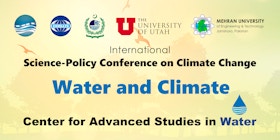Introduction
Pakistan is among the top ten most affected countries on the Global Climate Risk Index (CRI, 2016), and currently faces a number of climate-related challenges, including rising temperatures, unpredictable changes in precipitation patterns, increased frequency and intensity of extreme weather events, recurring droughts and floods, groundwater pollution, rising sea levels, potential for heightened conflicts over water rights between riparian regions, increased health risks due to changes in disease vectors, environmental degradation, especially of water-related ecosystems, declining agricultural productivity, and governance issues associated with these stresses.
It is well known that most of climate-related stresses operate through the hydrological cycle.
Climate change affects the volume and variability of inflows (including glacier and snow melt as well as precipitation), which in turns poses threats to food security, the safety of water-related (and other) infrastructure, civic services, human health and hygiene, the health of water-related ecosystems, and hydropower generation and energy security.
Publish your content with EB Publishing
It's about who you reach. Get your news, events, jobs and thought leadership seen by those who matter to you.




